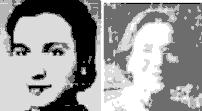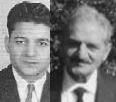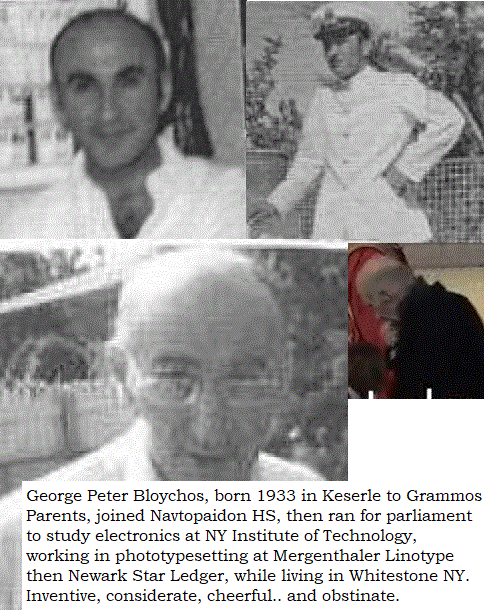


My mom was a graceful, elegant yet forceful lady and one of the most
intelligent persons anywhere. Yet life manifested itself to her as a series
of broken promises. Born Maria Petru Bluhu to Kastorian refugees of Bulgarian
ethnic cleansing (East Rumelia Catastrophe), across the same University of
Athens that formulated the basic structures of Christianity and science, on a
street named for Aristotle, who like my mom's parents was born in Macedonia
but settled in Athens - the winds of world conflict sent my mom's family to a
strange, jealousy-driven Thessalian town from which my mom's father was
eventually kidnapped, tortured and killed for having lived, illegally, in
America. Rather than take the entrance exams to Athens Polytechnic, my mom
became a military typist and supported her six younger siblings, moving them
back to Athens. Duty to her family made her come to America to tend to a
dying uncle, only he died while she was on the plane. Here, she met and
married my dad, who wanted, like her, to be a chemical engineer, only that
promise too was broken and he waited tables instead. They paid their first
rent with a bag of coins and kept going and I became the reason for
everything they did. To this day it becomes impossible to comprehend how they
spent a third of their income just on my education.
I remember how my mom not only tended to my scraped knees but to
those of all the other kids, with all the newest, well thought-out
treatments. I remember how my mom not only taught me to excel in school, but
tutored our neighbors as well. I remember how she wanted things so perfect,
her hands were always bleeding, and the staircase was always thumping with
her hurried march. I remember how she never left well enough alone, improving
yet simplifying every design, every recipe, every activity with a
determination worthy of a Japanese industrialist. I remember how she sent me
for piano lessons, for tennis lessons, anything she could to make up for what
she was promised herself but never had. How she tried to learn piano herself
from home-study cassettes. How she never left my school administrators alone
with questions, complaints and suggestions. How she and my dad would read
voraciously, many times correcting teachers and doctors who were too arrogant
to expect these immigrants to know anything. Just when I thought I was
finished, she would only raise the goalpost and look at things from one more
unique perspective. How the minute her soprano voice opened up, half the
church would turn around but she never noticed as she seemed to be in a
conversation with G*D. How she objected to our getting a dog but could never
refuse his pleas for treats and walks where this huge sled dog seemed to be
walking her instead. How when I was having trouble with Organic Chemistry,
she named it Organoula, as if it was a girl I was courting, that needed to be
showered with attention and gifts like a telescope and tape recorder to
accomodate that unusually large lecture hall. How when my dad took a violent
neighbor to arbitration and won, she turned around and told me to be
forgiving to our troubled neighbor. How our dentist recently told me "When
they made your mom, they broke the mold."
No picture of my mom would be complete without mentioning my dad. My
mom saw my dad for what my his aspirations were, not how the psychological
baggage of orphanhood got in his way; since her own siblings suffered the
travails of orphanhood, she was awestriken by my dad's courage in the face of
incredible obstacles. My parents shared a passionate desire to make
everything the best they could with a dogged and yet compassionate
determination. When a crazy neighbor waved a pipe at my father, my mother
screamed at him - but only when the neighbor waved the pipe at my mother did
my father drag the neighbor into arbitration - they did things for each other
they would never think of doing for themselves.
She died on Taxiarch Archangels Day, thirteen days, almost to the
minute after the ambulance picked her up. She left our house exactly 33 yrs
to the day (St Dimitrios Day) after we moved in. She was 73, I was 37, the
same age she was when I was born and the age my godfather/uncle was when my
granma died. She first arrived in New York forty years ago on 14Oct58. She
died at Memorial Sloan Kettering Cancer Center in New York of a 1993 cervical
cancer that had metastased to (among other places) her cervical spine and was
buried 13th November, near her mother, with the funeral nearby at Prophet
Elias Church in St Paraskevi suburb of Athens.
- = -
My dad grew up in a cruel environment, surrounded by cruel cliffs,
cruel crude people, cruel abusive opportunistic guardians, the cruelness of
orphancy, and cruel wars. This made him combative and untrusting, never
turning off his scanner, always in a sloppy hurry, even creating unnecessary
things to worry about, and always feeling that no one fully appreciated his
pain, suffering and sacrifice, yet always offering to suffer and sacrifice
some more. He kept trying to understand a world that never quite made sence
to an orphan's eyes. All fourteen years worth of his education (including
Athens Business School, CCNY and U S Carolina; having failed entrance to the
Athens Polytechnic by only the law section) were at night, moving to
ever-larger towns in search of more advanced night schools, having lost both
parents to illness and accident before he was five. That early orphancy left
him with a subconscious, involuntary wildness which his voluntary, conscious
self bravely always sought to subdue. My mom always insisted that his soul
always had the desire to seek out good, whatever complications these earthly
"outer garments of the skin" would throw his way. When my mom died, he
complained to me that he was an orphan again.
Somehow, he just could not be content doing as others before him. He
had to keep trying, even though he often hated what he achieved, feeling as
if he somehow didn't deserve it or others would envy his success. When a
Jewish man whose store he supplied sought refuge my dad felt he had to help,
and would not reveal whereabouts even when the nazi officer kicked my dad
with bicycle down the steps of parliament. His education was interrupted by
nazi and red warfare, and after he spent four years as a supply corporal
fighting reds, he preferred to come to America rather than be sent to
Korea. A cousin of his, you see, had bought the passport of a dead man, and
invited my dad over. When he was in the USA for six months, he knew it was
time to enroll in City College of New York when he was asking his customers
at a Bellrose diner for the meaning of some word in the Readers Digest, and
when the customer didn't know, my dad replied "What kind of an American are
you that you don't know this word?"
Sick, and ready to give up, he met my mom, who smothered his pain and
suspicions, ignored his posturing and always saw through to his genuinely
decent intentions. When they liberated Kastoria from the reds, my dad had to
appropriate a restaurant, and ten years later, in New York, he frequented
that same owner's restaurant, where they introduced him to his wife. She
could see through the orphan's inability to control his emotions, having
helped raise her own six younger fatherless siblings. So he gave up school
for good after his son was born and worked two shifts from ten in the morning
to two in the morning, waiting tables at some of the fanciest restaurants in
New York, spending a third of his income on twenty years worth of private
education for his son, who, having no choice but to emulate his dad's
hyperactivity, fortunately completed in seventeen years. When his son was in
second grade my dad saw sharing a beer with his brohers-in-law made him way
too violent and my dad had the incredible willpower never to have another
beer again. When Civil Rights was still a new idea and a neighbor wanted to
rent his basement to a Black Texas quarterback, only my dad stood by the
Jewish plumber neighbor against the bigots. But his incredible will was
sometimes unbearable to be near when it lacked a useful focus and flailed
about aimlessly. His younger brother called him "Mr. Goody" for the way he
always tried to set things right.
Even in retirement he could not quiet down, reading several
newspapers and magasines a day, and climbing the slippery cherry tree until
he got every last cherry before the birds did. my dad went crazy over
Readers Digest, John Wayne and the Police Athletic League, because he felt
they showed he was a "strong character". He always kept busy always finding
something to worry about, making up with his eagerness what his hurried
sloppiness almost destroyed.
He had worked for the Georgopoulos Athens law firm, for the Pireus
Patras textile concern, and for Champs Elysee, Sea Fare, Double Dolphin and
Joe Kipnes Pier 52 restaurants. He retired in 1985, having had a massive
heart attack ten days before his planned retirement. He died on 9th October,
2002, after a three year battle with gastric, intestinal and prostate cancer
and a seventeen year battle with cardiovascular disease. He was buried on
12th October at Flushing Cemetary.

ABBREVIATED FAMILY TREE AND HISTORY
Christodore Panagiotopoulos (Prussos, Aetolia)
Basil Panagiotopoulos (Korykista, Prussos)
Georgia Stingas (Agrinio, Aetolia)
John Panagiotopoulos
Spiridon Kaltsounis (father from Epirus)
Panagiota Kaltsounis (Vlahernae, Aetolia)
Anthi Zografos (Micro Horio, Aetolia)
Vasos Panagiotopoulos
Dimitrios Blouhos (Grammos, Kastoria)
Peter Blouhos (Grammos, Kastoria)
Maria Mizzios (Grammos, Kastoria)
Mary Blouhos (born Athens, raised in Sykourion, Larissa)
George Karamanlis (Grammos, Kastoria)
Helen Karamanlis (Grammos, Kastoria)
Narange Pissios (Grammos, Kastoria)
FamilyTreeDNA.Com:299704 Geni.Com:2699677726 Ancestry.Com:vasjpan2
Ancestry.com DNA: Europe 92% Italy/Greece 63% Europe East 24% European
Jewish 5% West Asia 7% Caucasus 4% Middle East 3%. FamTree DNA Genetic Map:
N Medit 50% Trans-Ural 15% Euro Coastal Plain 6% Anatolia & Caucasus 29%
Panagiotopoulos adopted by Kapitanissa Panaetologiannina of Arta ca 1821;
translates to Sanctisimopueri (Latin), Alhaligson (Old English) or just Hale.
Bluhi is a small rodent (trooctic, mustela) like ermine, mink or weasel.
Karamans were Christian Cappadocian Turcomans supporting Pontian Comnenes
against Ottomans. My granma's cousin, 1912 victor COlonel Karamanlis was shot
by Venizelists (pangalos?) hence some relatives dropped the N.
Pissios came from Cephalonia where they were named Belias.
Kaltsounis (socks, cognate: calzone) originally came from Epirus.
Our village on Grammos was known as Slimnitsa and now is Trilofos
Ieropiyis in Nestorion township (dImos), Kastoria county (nomOs). Our
immediate family was ethnically cleansed from Grammos by the Bulgarians
during the 1885 Eastern Rumelia Catastrophe. As Slimnitsa is the mountain
pass to Albania and one of the trip wires most invaders of Greece must pass,
the residents of the Grammos villages were deported to Albania by Ali Pasha
(1800), the Bulgarian Commitadges (1885) and the Greek Reds (1947) and the
largely destroyed villages were combined into Ieropiyi (Holy Fountain) after
the civil war.
Korykista is also known as Karryes Prussu, Sydendron and
Katavothra. Prussos is named for Prussa, or Bursa, the Asian part of
Constantinople, from which the Lucan icon of the Virgin Mary fled the
iconocalsts, landing in Aetolia.
Both Prussos and Grammos are in the Pindus Mts which is the Greek part of
the Alps. My ancestors were mostly shepherds, but the Grammos side became
lumberjacks and wood merchants after a fire in Sophiades in 1878, whereby
they set up trading posts in Sper'hiatha Lamias and Sykurion Larissa.
Kinross says the Turks were reluctant to go up the Pindus because it was too
cold, which is why we claim to be the purest Greeks. Adcock mentions how my
Aetolian archer ancestors sniped invading Persians and Celts from tree
tops. Both my ancestral homelands are now being developed by the Germans as
ski resorts, and the revived Ignatian Highway will go through Nestorion.
My dad was a supply corporal in Mesopotamia, Kastoria during the Civil
War, where he appropriated a restaurant owned by Christos Kletsidis to feed
the troops. A decade later my dad frequented Kletsidis' Manhattan restaurant
ca 28&8. My mom's granma died in Kastoria while my mom was here and her
brother was told my mom should seek out Kletsidis, who introduced my folks.